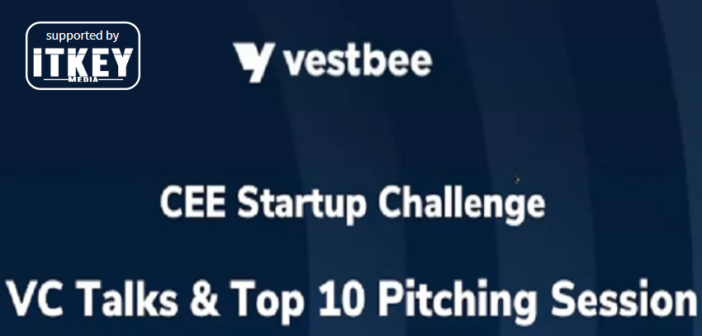- Vestbee’s CEE Startup Challenge 2023 Finals came complemented with VC Talks with an insightful discussions
- CEE’s top-tier VCs were speculating about what 2024 has in store
- In addition to the apparent AI focus, the forecast priority industries include health tech, edtech, and climate tech
- Investors also expect 2024 to be economically more tough for the startup ecosystem than 2023 was
On January 7th, Vestbee‘s CEE Startup Challenge 2023 Finals brought together representatives of tier-one funds operating in the region. Ten select startups got to pitch before them, and in addition to that, the esteemed investors shared their insights about the ongoing and prospective trends in venture capital and startup ecosystems.
ITKeyMedia spotlights the discussion. The participants were:
- Ewa Chronowska, CEO at Vestbee and General Partner at Next Road Ventures
- Marcin Hejka, General Partner at OTB Ventures
- Bakhrom Ibragimov, CEE Region Partner at Molten Ventures
- Merve Zabci, Managing Partner at Metis Ventures

Ewa Chronowska, Partner at Next Road Ventures, CEO at Vestbee
Ms Chronowska took on the role of the discussion’s moderator. After the participants introduced themselves, the discussion began with generative AI, seeing how ChatGPT-3 has recently celebrated its first birthday. More specifically, the host asked the VCs to share how this innovation affected their lives and work.
AI,Of Course
For Mr Ibragimov, the AI-powered engineering solutions – more specifically, large language models (LLM) – allowed for scaling operations significantly. This megatrend unpacks a lot of the technology stacks,which opened a lot of opportunities for investors for a number of years to come.

Merve Zabci, Managing Partner at Metis Ventures
Ms Zabci pointed out that it’s becoming ever easier to access new technologies, not just AI. As for the acceleration of AI development, it has led to its expansion to many new use cases. For instance, Metis Ventures’ portfolio companies can adopt AI much easier than only two or three years before. Ms Zabci noticed that these companies particularly actively employ AI in interacting with their clients – e.g. for cold generation. Another widespread use case is coding copiloting: according to her numbers, up to 78% of any code gets written with AI assistance today, which points to extraordinary manpower enablement that it allowed. Generally, MsZabci sees the current popularization of AI as an illustration of the overall democratization of technology.
Mr Hejka stated that AI should help fix a great number of inefficiencies in many spheres: enterprise management, healthcare (including veterinary), and many more. For example, developing a new drug can take up to ten years and several billion dollars, most of which will be linked to analyzing the interaction between drugs. AI can help minimize both the time and cost in a way that seems impossible without AI. On a larger scale, it can help solve the global problem of decreasing productivity that all verticals have been experiencing for the past 30 years or so and that led to many macroeconomic problems of today. Mr Hejka is convinced that AI applications that can help solve this problem are practically unlimited.

Marcin Hejka, General Partner at OTB Ventures
As for trends, Mr Hejka warns against possible attempts to regulate AI. He believes that since it’s a new technology, it cannot work well under strict regulations and, consequently, neither can the regulations because there wouldn’t be a lot to regulate. In other words, AI regulation is a task for a later point in time.
Outside AI
As for other industries, Mr Ibragimov named CleanTech and noted the support from governments. Ecology-related problems are enormous, and so are the opportunities that they present for tech startups and VCs. Other industries worthy of special attention according to Mr Ibragimov are life sciences and healthcare as they haven’t benefited from technology the way they deserved. The same can be said about education. Needless to say that AI also opens a lot of new opportunities in these industries.
Mr Hejka believes that the consequences of inflation and recession will be felt much more acutely in 2024 than they were in 2023, including smaller new funds and the increased mortality rate among portfolio companies. As for continuous growth and generating opportunities, he expects it in space technologies and dual use / defense technologies. As for the climate, it is apparent for Mr Hejka that the darkest hour awaits us, and thus, the progress of climate tech is natural.
Fundraising and Business Development in Tough Times

Bakhrom Ibragimov, CEE Region Partner at Molten Ventures
In such difficult times, startups have no choice but to focus on value-generating growth, Mr Ibragimov stated. Moreover, seeing how the VC/startup ecosystems aren’t the only ones that face cutting costs, it’s up to startups to tackle this challenge and succeed by offering enterprises new ways of cutting costs, which should also help improve the overall economic situation for the benefit of every party involved.
To conclude on a positive note, Ms Zabci argues that 2024 should be the year of finally going back to normal after COVID. Companies that do have value and meaning will survive because VCs still have significant amounts of undeployed capital available for startups.

Kostiantyn is a freelance writer from Crimea but based in Lviv. He loves writing about IT and high tech because those topics are always upbeat and he’s an inherent optimist!





